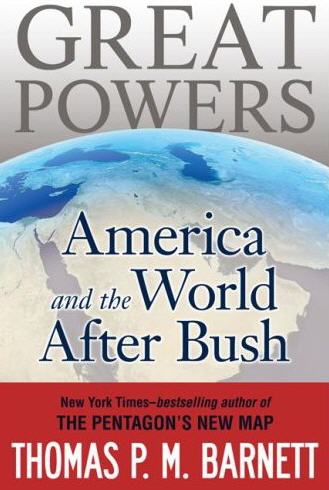Blogging and Strategic Thinking
Thomas Barnett reflects on how blogging has made him a better strategic thinker:
With the blog, I can now attach my first-impression analysis to the formal citation, with both hot-linked to the full article and stored in a content management system — the blog — that I can instantly access and search from anywhere in the world.
In this sense, generating and maintaining the blog magnificently expanded my professional “RAM,” or random-access memory storage capacity. Without that upgrade, I simply couldn’t write or think at the level I do today, nor could I cover as much of the world or so many domains. Without that reach, I couldn’t be much of an expert on globalization, which in turn would seriously curtail my ambitions as a grand strategist — because nowadays, strategic thinking requires a whole lot more breadth than merely mastering the security realm. To be credible and sustainable in this complex age, grand strategy requires a stunning breadth of vision when judged by historical standards. So as far as this one-armed paperhanger is concerned — no blog, no grand strategist.
And I have to tell you, just making that admission in 2010 stuns me. But without the blog’s organizing and storage capabilities, I’d be reduced to a parody of “A Beautiful Mind”: tacking news clippings on walls and feverishly drawing lines between them, desperately seeking patterns but constantly falling behind the data tsunami. The blog thus prevents the early onset of what I call “strategic Alzheimer’s,” which is what happens when a strategist’s growing inability to process today’s vast complexity provokes a sad retreat into the past and an overdue reliance of history-is-repeating-itself arguments. But if a strategist no longer “gets it,” it’s because they’ve stopped trying to “see it.” The blogging “lens” corrects their vision’s lack of acuity.
But my blog is also my daily workspace, and I share it with strangers — for free, mind you — because I want to pass on this largely lost skill set of strategic thinking to others. I especially hope to reach the next generation of grand strategists, who would otherwise have to rely primarily on op-ed columnists’ flavor-of-the-news-cycle habits, with new “Manhattan Projects” proposed and “Marshall Plans” demanded every other month. Consider it a one-to-many offer of virtual internship.
Now, I don’t consider OTB to be some sort of graduate seminar. Then again, it’s less topically focused than Tom’s blog and I frequently write outside my areas of expertise because I’m guided by what interests me.
Still, blogging is very much a way to live the “life of the mind” that drew me to graduate school and a professional career that has included university teaching, book editing, and think tankery. It’s a way to organize my thoughts and track how they evolve as information flows in. And it forces me to write, quite a lot, on a near-daily basis in front of a live studio audience.
In the academy, especially, every incentive pushes scholars to narrow their focus. That’s great for building in-depth expertise but bad for seeing the larger picture and drawing connections useful to readers outside one’s microspecialty. Blogging pushes — perhaps too far — in the opposite direction, encouraging reading much more divergent materials from all manner of smart people. Barnett manages to achieve the best of both worlds, blogging on a daily basis while constantly working on the next book project.





While I will confess that that “grand strategist” bit sounds bit over the top, I agree with his basic point (at least for me). I do use my blog, in part, as a place to take detailed notes on things that I think I may want to come back to later (as well as to force myself to write larger iterations of things that I might otherwise be tempted to leave to far less developed notes that I might forget I made).
Several of my recent posts on Colombian politics fit that bill–and I know full well that only a handful of my readers care about them. Of course, such behavior may also have something to do with my visitor numbers 😉
That guy’s blog is boneheaded. Anyone who starts a post with so-and-so and I “went to Harvard together” is a pretentious a$$hole.
“Grand Strategist”? Give me a break! Who does he think he is, Karl Marx?
I like Steven Taylor’s model–and actually his blog is great for the insight on Columbia.
Barnett is a Thomas Friedman-wannabe, pushing platitudes as “analysis.”